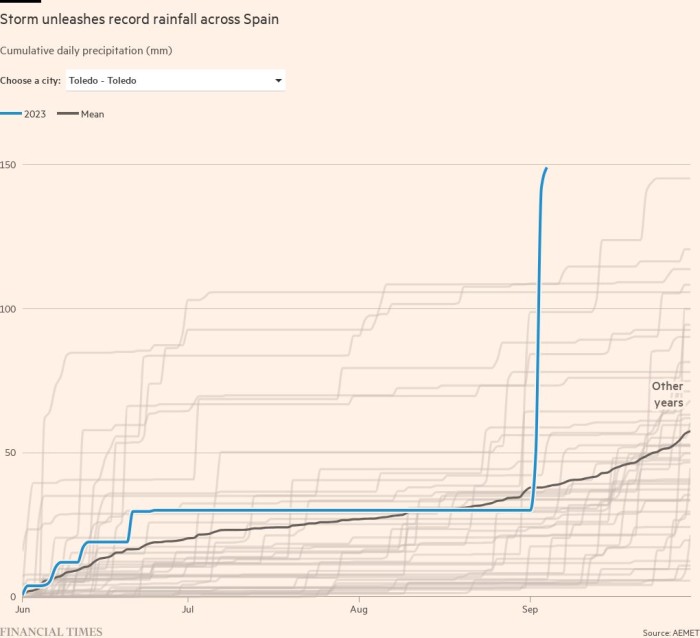Receive free Climate change updates
We’ll send you a myFT Daily Digest email rounding up the latest Climate change news every morning.
Flash floods around the world in the past week, after a season of record heatwaves, have been exacerbated by the high temperatures baking the ground and making it less able to absorb water, scientists say.
Following extreme rainfall in Europe and the US last week, on Friday Hong Kong was paralysed as rain associated with Typhoon Saola submerged metro stations and trapped cars, halting schools and the stock exchange.
The HK Observatory recorded more than 158mm between 11pm and midnight local time, the highest hourly rainfall since records began in 1884, the government said.
In Japan, tropical storm Yun-yeung brought the heaviest daily rains to some eastern regions since records began, officials said. Mobara recorded 392mm of rain into Saturday, the most to hit the city in a 24-hour span since 1976, when tracking began.
During the week, storm Daniel battered parts of southern Europe and the Mediterranean region, with floods sweeping across central Greece.
After weeks of record summer heatwaves, up to 800mm of rain fell in 24 hours, or more than a year’s worth of rainfall, on the Greek plains.
Larissa, a large agricultural hub, suffered the loss of crops and houses as river banks burst, while houses and roads flooded and cars were carried away in the city of Volos. as well as the popular tourist island Skiathos.

In Spain, exceptional levels of rain were also experienced in a short period compared with historical rainfall. Toledo recorded 91.8mm in 24 hours, while Puerto de Navacerrada had 114.8mm of rain in a 48-hour period.

Scientists say that record temperatures may be driving the increased rainfall and flooding. The period of June to August this year was the hottest on record with an average temperature of 16.77 degrees, 0.66 degrees higher than the 1990-2020 average, the Copernicus Climate Change Service reported.
Europe endured its fifth warmest summer temperatures on record, with an average of 19.63 degrees, or 0.83 degrees above the average.
Copernicus also said that the above-average rainfall had affected western Europe, Turkey, central Europe, Scandinavia, California and western Mexico, triggering floods in those regions over the June to August period.
“There are well-understood thermodynamical arguments indicating that increases in temperature will lead to an increase in the amount of water vapour the atmosphere can hold,” said Copernicus director Carlo Buontempo. “Climate models expect this increase in water vapour to translate into an increase of the most intense precipitation.
“Heavy precipitation will generally become more frequent and more intense with additional global warming.”
The flooding has also been exacerbated by the high temperatures drying out the ground, making it less able to absorb moisture from rain and creating excess run-off, which leads to floods.
“The heatwave and wildfires have not helped matters because the ground has been baked and much of the vegetation burnt,” said Professor Mark Macklin, director of the Lincoln Centre for Water and Planetary Health.
However, Buontempo noted that while “an upward trend in the intensity of the most extreme precipitation has been recorded in most of Europe, the evidence is less robust over the Mediterranean”.
“The impact of the warming sea and atmosphere . . . is inconclusive, but the thermodynamic argument [once more] suggests that the intensity of the precipitation associated with this event is likely to increase as a consequence of the warming.”
Experts also noted that Greece’s mountainous terrain contributed to flooding.
“Whenever you get torrential rainfall you get very high rates of run-off because a lot of the catchments have got extensive areas of bare bedrock so precipitation translates into floods almost instantaneously,” said Macklin.
The extreme conditions across Europe could also be explained by an “omega block” over Europe. If the jet stream — the strong winds above the Earth’s surface that control areas of pressure in the atmosphere — breaks down due to storm activity in the north Atlantic, pockets of high pressure can become trapped in between pockets of low pressure.
The areas of high pressure inside the omega, such as the UK, can experience unusual heat, while areas outside such as Spain and Greece see stormy conditions.
Climate Capital

Where climate change meets business, markets and politics. Explore the FT’s coverage here.
Are you curious about the FT’s environmental sustainability commitments? Find out more about our science-based targets here
Credit: Source link













































